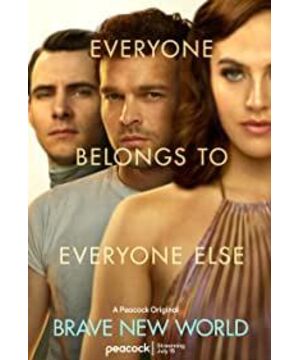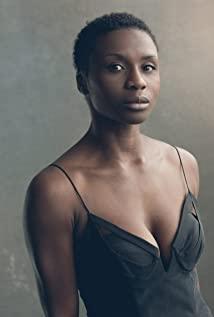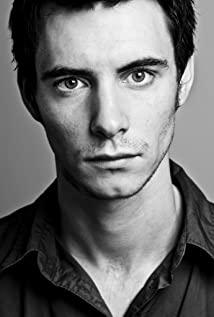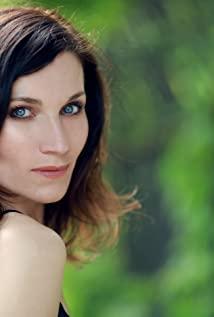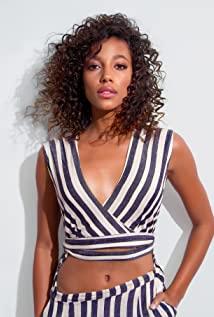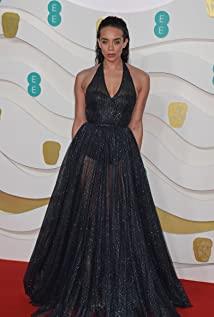"When you can't choose, you stop being human." - A Clockwork Orange
When I was young and my knowledge was still shallow, Huxley's Brave New World didn't give me a lot of feelings. In contrast, Orwell's "1984" had more beautiful text and more three-dimensional characters. The plot is more twisted. But when I carefully understood the deep meaning behind it, I found that in the past I focused on beautiful things, but what these works really touch are ethical and practical issues .
Brave New World was written before 1984, but in fact, 1984 is a disappearing past, and Brave New World is a future we are about to arrive at. The former depicts a society full of fear, struggle, and human nature; while the latter's existence is gentler, more thorough, and paler, in which human beings have been domesticated into happy slaves.
As a classic work of dystopia, we still need to return to the concept of "dystopia" itself, whether talking about itself or its later adaptations.
"Dystopia" exists in opposition to the concept of utopia. It is usually based on the existing idea or reality to build a highly developed and perfectly functioning utopian world , and in turn exposes and criticizes the shortcomings and deficiencies of this reality or idea to achieve a wake-up effect. And because people's will to life will unconsciously pursue survival and reproduction, it is impossible to have utopia where there are people. Therefore, the so-called "utopia" is either a fictional concept or an object to be criticized. In many cases, utopia is actually another form of dystopia.
"Brave New World" is an American drama of the same name, but it is precisely a misunderstanding of "dystopia".
01 What is dystopia against?
Natsume Soseki once wrote, "Sympathy, love, justice, freedom are everywhere, all these fashionable things are at work in the world." This is a quip, of course. The dystopian genre may have also become such a popular thing . When we mention dystopia, we may immediately think of: totalitarian government, highly unified slogans and behavior patterns, ubiquitous monitoring and management, class contradictions, and perhaps resistance and compromise.
In the worldview of the "Brave New World" series . "Brave New World" has three principles: no privacy, no family, no monogamy; five grades: Alpha, Beta, Gamma, Delta, Epsilon; Humans change from viviparous to bottle-born, parents The concept of and family has become the name on the nameplate in the exhibition hall, and this social relationship itself has also become a shameful and unethical existence. All people have been subconsciously trained and restricted since childhood, and are constantly instilled with rules such as hierarchy and ethics. So human beings are built out of factories like machines and given fixed patterns of behavior .
At the same time, this worldview also incorporates the key elements of the classic dystopian works of "Brave New World" and "1984": under a totalitarian society with strict hierarchy, contradictions are completely eliminated. Surveillance has become more common and routine.
The former relies on a special drug called numbness, which is actually a psychotropic drug, or a hallucinogen. It provides people with happiness and security, and if you have negative emotions, eat it. So in the "new world", everyone can live and work in peace and contentment, without suffering, and without the need to work hard for a living, and everyone is content with his own class .
The latter was monitored by Big Brother in 1984, and turned into an intelligent system created by the show's worldview. Through this system, everyone can see everyone else - where, with whom, and what they're doing. But this is not offensive, on the contrary, human beings are given everything they want, whether it is happiness, sensual pleasure, freedom, as long as under this system, everything you want will be be given .
After understanding this, let's look at this "Brave New World": it is actually a very beautiful and stable social structure in which everyone can find their place and be satisfied. The premise is that you have to abide by the rules.
One day, a savage named John broke into the "New World". He could pass through the telescreen that separated the savage area and the new world, and enter and leave the new world at will, that is to say, he broke the rules. Here, he finds everyone pressing a device containing numbing pills incessantly. People are "clicking" and "clicking" on the tube, and this action actually implies some kind of fixed violence . From the audience's point of view, it is cutting the spider silk leading to pain and rationality again and again, bringing people back to the hell of happiness. In the play, the savages who can't bear to be treated like animals, launch an uprising to kill the New World human beings who come to visit; John, who is unwilling to indulge in mindless pleasures, stirs up the dissatisfaction of the inferiors in the "Brave New World", lead them to rebel against the upper echelons. These are plots that didn't exist in the original. But can this happen?
The dystopian society does not come suddenly. Its establishment must go through a continuous evolution and gradual process, especially in this stable "New World" society, its existence also has a profound social foundation : everyone is born from birth. To receive sleep education and conditioning training, the input concept is like a "thought stamp", which is continuously consolidated and strengthened through behavior and language until it becomes an unconscious action like eating and sleeping. If there are still people who are not satisfied, then they will be sent to the Savage District to experience the absurdity and bizarreness there, and feel how beautiful their current life is.
So even though both Orwell and Huxley depicted a world deeply divided between superficiality and truth, the former's repressive rule still had an element of instability, while the latter's system has completely eliminated this instability factors to construct a complete and stable society .
People have moved from rebellion - the world of 1984 - to compromise and compliance, so the question is, who and what? The novel of Brave New World does not rebel against a fixed entity, but expresses the individual anxiety about the enslavement and assimilation of human beings in modern society, and it is a reflection on how human nature is deprived . At the end of the novel, John chooses self-imposed exile, preferring to stay away from such "beauty" and seek some "freedom" that he has not yet seen.
And let's look at the drama again, the confrontation between the savages and the new world, the confrontation between the bottom and the oppression, can be completely replaced by racial struggle and class struggle. Both Savage and John have revolutionized the new world, but the seeds of struggle and resistance don't actually exist - you'll fight the whip that hits you, but how can you fight the shallowness of human nature?
02Which ideal life do you want to live?
What ideal life do you want to live? When you try to find an answer to this question, you have fallen into a trap. And this is also a trap carefully arranged by the "New World" for mankind.
The ideal life described by Marx is: "...hunting in the morning, fishing in the afternoon, animal husbandry in the evening, criticism after dinner, but this does not make me a hunter, fisherman, shepherd, or critic." The big male protagonist, John, also described his ideal life in this way: "Imagine only us, no one else, a small house we built with our own hands, and everything we need grows in the ground, provided we work hard."
Brave New World is a rational society based on technology and constructed entirely with reason. It directly tells you what kind of life is ideal, you can pursue this or that life, the choice is yours. There is no social division of labor in the first two, and there is no hierarchy and class society. In order to survive, people must work hard. The latter seems to be normal, and people can still pursue the life they want.
There are still differences between the two. How to choose the ideal life offered by the New World is like rolling the dice, with only a few fixed options. And the scary thing about it is that you don't even know that there are other options, and you don't know that you don't have to choose. This is a kind of hidden violence , just like eating hemp .
But we can still ask the question: Both John and the "New World" describe a utopian ideal of life, but which one would be happier?
In the novel, it ruthlessly rejects both answers.
"The Handmaid's Tale" once had such a line, "There are two kinds of freedom, one is to do whatever you want, and the other is to be carefree." But we all know that the latter is not true freedom, it is given, It is the false freedom of "freedom is slavery".
An unexamined life is not worth living, and neither is unexamined freedom. This is Huxley's answer.
The answer given in the drama version, don't think, is John's one. So in order to intensify the contradiction, it set up a villain, the artificial intelligence Yingzhuo, to stand in front of John who is pursuing this kind of life. In the later stage of the plot, there is a confrontation between artificial intelligence and awakened humans, forming a higher point of contradiction, and humans have to rise up to overthrow the rule of artificial intelligence.
This is actually a transfer of the core contradiction. The thing that controls people has been changed into a machine, which weakens and blurs the problem. What the protagonists have to resist is no longer the "evil" of the social system and the totalitarian government. The fundamental evil of society has shifted from rulers holding power to artificial intelligence that threatens humanity as a whole.
Huxley's "Brave New World" is a fable. The issues it discusses about freedom and human society are in fact naturally related to robot-type stories. But don't forget that the story of all robots is often the story of humans. Machines are the tools of storytelling, and the focal point of the story is still people - how "people" are defined, how human societies are formed.
And what the show presents is not a debate about how people should exist. It elevates the logic of "slavery" hidden on the back to the surface. People no longer need to think about whether they should resist and why they should resist ; it is a foregone conclusion that a human being must get out of slavery (whether it is human or AI) , or The opposite end point. It tells you that you just have to fight back. But we don't need yet another vulgar story of rebellion against evil.
03 This utopia, are we still against it?
Let's take another look at why the TV series Brave New World is so poorly rated. Criticism of dystopian society does not necessarily have to deny it, and faithful presentation is the best irony. The series intervenes from the perspective of contemporary people and shapes a new world where totalitarianism, class solidification, free will and will to life do not exist. But at the same time it presupposes that it sees it as a wrong world that needs to be overthrown . And since then, it has gone against the theme of the "dystopian" genre.
Brave New World is solid and cannot be easily destroyed. Its confrontation should be the confrontation between the individual and the system . This is almost a martyrdom. The sober and independent individual realizes that he is in the distortion of the society, and the resistance is nothing but a hopeless struggle. As a heretic being, John is out of tune with this new world, and he ends up either being transformed like Alex in A Clockwork Orange, or driven to death by "civilization" like in the novel.
But let's look at this drama again, its shortcoming is not even the decline of the theme, but the lack of logic in the play itself. For example, the people at the bottom led by the savages can succeed as soon as they resist without encountering any obstacles. In such a perfect society governed by AI, this kind of plot setting is obviously very inconsistent. In short, it's an untenable utopia.
The show chose a ridiculous eclecticism, and the world it presented was actually more like we opened a game of "The Sims". We are John, who can enjoy the convenience and entertainment brought by New London and the status of the upper class with peace of mind, and can incite the revolution of the lower class without any scruples, and can also talk vigorously about an idyllic idyll. in love. While the New World is enslaving people with the theory of happiness, we (John) are actually enslaving them with the idea of freedom.
Let's go back to the novel and think about the people of the New World, do they -- do they really need salvation?
The original "Brave New World" spent a lot of space, depicting a utopian society that has been stabilized and formed, and a heresy who has strayed into it. The wandering and painful struggle; and in the ending part, with the savage John and President Mustafa between The debate offers a choice between value or happiness, freedom or security:
"I don't want comfort. I want God, I want poetry, I want real danger, I want freedom, I want beauty, I want sin."
"In fact, you are asking for the right to suffer."
This is the penultimate chapter of the novel. And the final truth of it is that there is essentially no difference between choosing Shakespeare or Shakespeare . John's ascetic practice and suicide were his personal "martyrdom", an experiment by the president, and finally became the "slack" of the people of the new world.
In the dystopian science fiction novel "Murdering Organs", there is a very playful plot. "Alex asked him back what kind of novels he was interested in, and he replied, 'Well, which ones are entertaining. Sex, drugs, violence, stuff like that.' So Alex smiled and handed them over. Give him a Bible."
What is really cruel is that in such a society, we have no way to resist, and the right to choose does not exist .
The TV series version of "Brave New World" is a clever adaptation. It seems to give a right to choose, but in fact it is just another form of nipple music - you are going to a party and want to A few grains of hemp, or watch the man-machine war?
This article was first published on the public account [Audio-Visual Bang]
View more about Brave New World reviews


